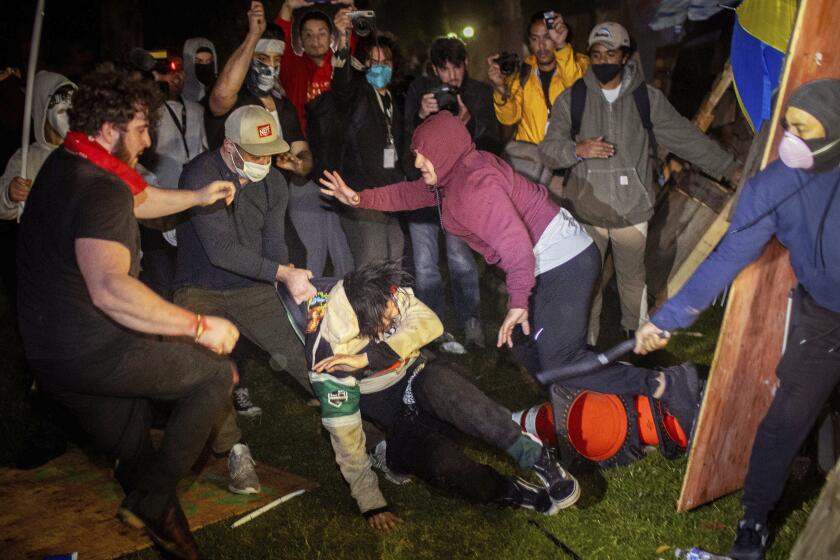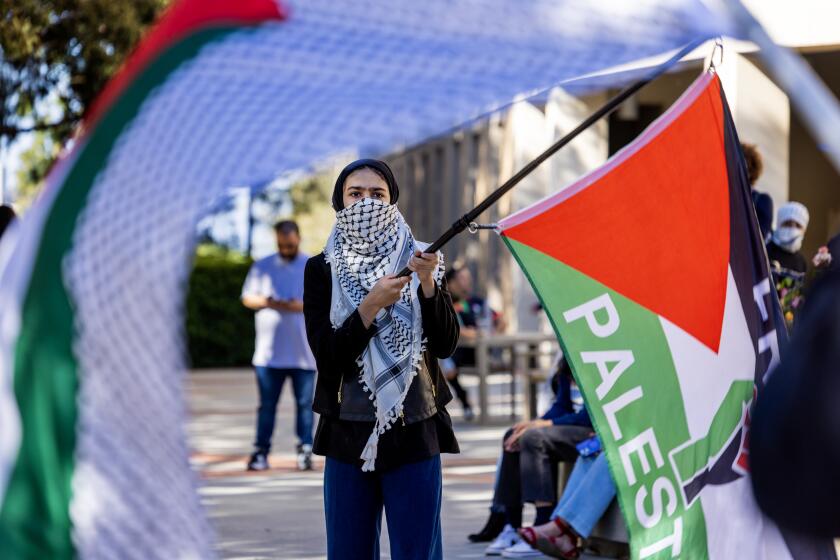‘Unacceptable’: Why it took hours for police to quell attack at UCLA pro-Palestinian camp
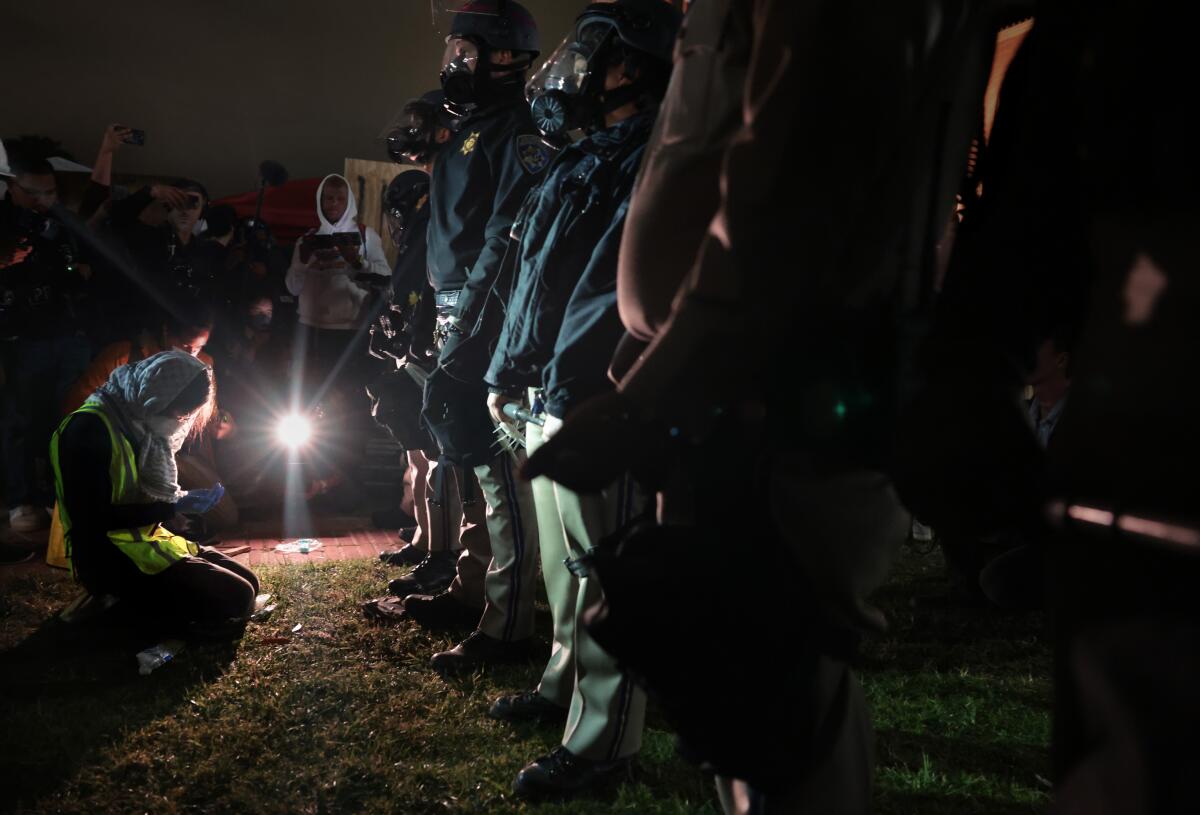
- Share via
When dozens of counterprotesters swarmed UCLA late Tuesday night, attacking the Palestinian solidarity encampment at the center of campus, university authorities were quickly overwhelmed.
Law enforcement sources told The Times there were only a few UCLA police officers on hand. They tried to stop the violence but were no match for the crowd and had to retreat, having been attacked themselves, the sources said.
A group of unarmed private security guards was there as well. But the guards were hired mainly to protect campus buildings, not to break up fights or make arrests. So they observed the scene as it descended into chaos.
It would take about three hours for scores of California Highway Patrol officers and police from Los Angeles and other agencies to fully bring the situation under control.
Hours of violence that unfolded overnight at a pro-Palestinian encampment set up on UCLA’s campus prompted administrators to cancel classes on Wednesday and has triggered questions about authorities’ response.
The response to the violence is now under increasing scrutiny, with many on campus and outside criticizing UCLA for not handling the violent counterprotest better.
“The limited and delayed campus law enforcement response at UCLA last night was unacceptable — and it demands answers,” a spokesperson for Gov. Gavin Newsom said in a statement Wednesday.
UC President Michael V. Drake, in a letter to the University of California Board of Regents obtained by The Times, said the way the incident was handled requires an outside inquiry.
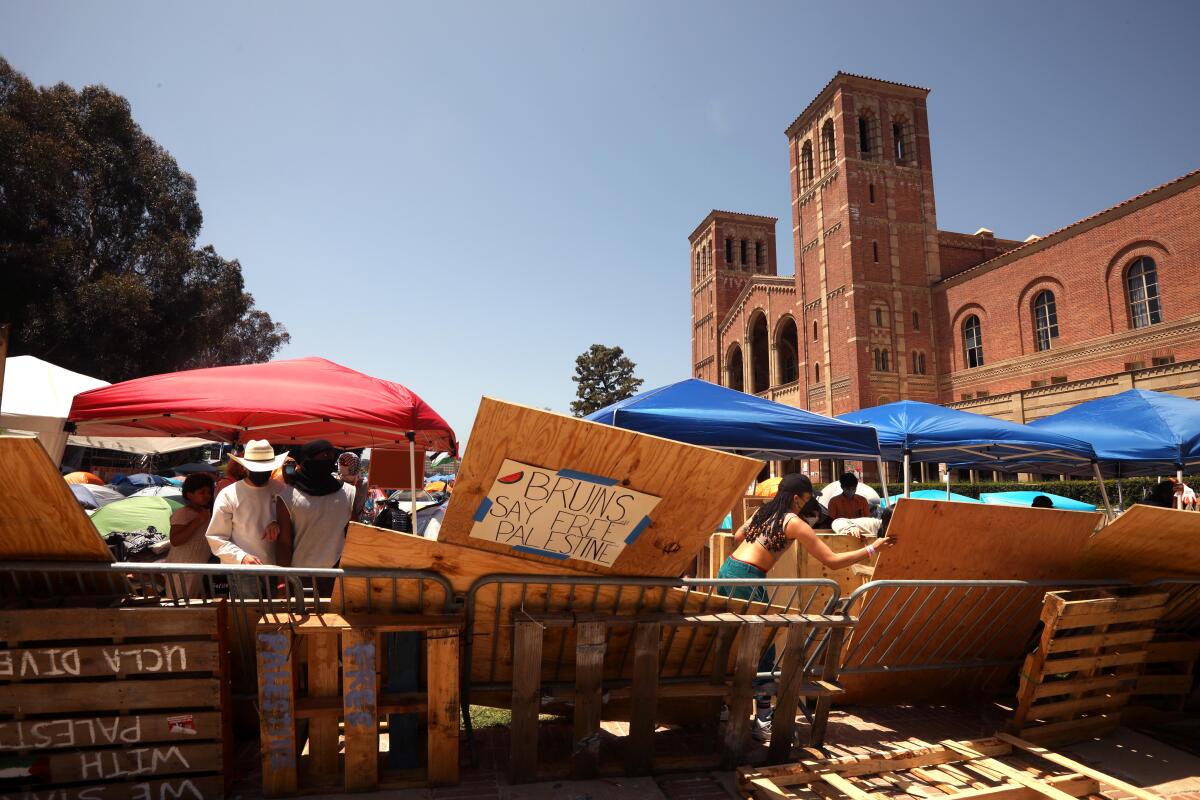
“There is sufficient confusion that I am ordering an independent external review of UCLA’s planning and its actions and of the mutual aid response” by law enforcement, he wrote in the letter. “I believe such a review can address many of my immediate questions but also help guide us for possible future events.”
Since the formation of the camp at UCLA on Thursday, the university had taken a mostly hands-off approach to protests.
While on the other side of the city, students in the USC encampment were arrested en masse by LAPD, at UCLA, students and others inside the metal-barricaded camp were left to protest day and night with little to no bother from law enforcement.
Even on Sunday, when pro-Israel protesters launched a dueling rally next to the camp and there were a few scuffles, the uniformed police response was minimal. After the rally ended, approximately two dozen uniformed officers from the University of California police and Beverly Hills police lined up in riot gear along Portola Plaza.
Then came Tuesday night, when the university’s tactics were tested and tensions between pro-Palestinian students and counterdemonstrators boiled over into violence.
It took hours for police to push away counterprotesters and bring calm to UCLA’s campus, raising questions about whether the campus was prepared.
“There need to be consequences, and there need to be changes,” said David Myers, a professor of Jewish history at UCLA. “It’s a total system failure, and we need to look ourselves in the eye and say how the hell did this happen?”
Myers said that while he applauded leniency toward students in the encampment earlier in the week, he was perplexed and disheartened by the university and law enforcement’s slow response to the “violent assault” on the encampment.
Myers, who was not present Tuesday night, said he and other professors stood between pro-Palestinian protesters and counterdemonstrators on Sunday to keep the two sides from clashing. He was concerned at the time by the lack of police response.
Photos: Clashes erupt at pro-Palestinian demonstrations on California campuses
“Sunday seemed in some ways to be a dress rehearsal for what happened Tuesday,” he said.
The violence began around 10:30 p.m., when counterprotesters arrived at UCLA. People inside the encampment quickly began asking for help, saying they were under attack. The counterprotesters, some wearing all black and white masks, surrounded the encampment and tried to break down the barricades, shooting fireworks at them and kicking the wooden boards around the camp.
The only people protecting the encampment and securing the area at the time were a few on-duty UCLA police officers, a source told The Times.
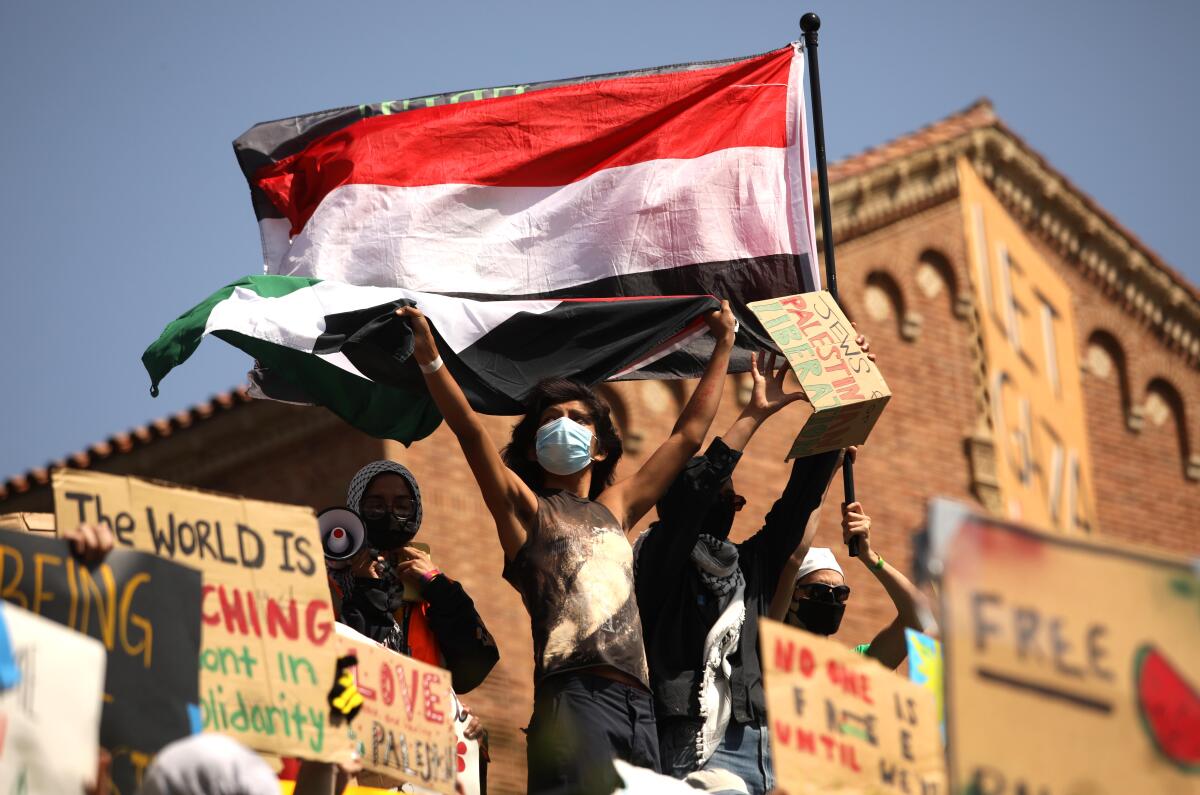
John Thomas, the chief of the UCLA police department, did not immediately respond to a request for comment. But he told the Daily Bruin his officers came under attack while helping an injured woman and had to leave. He placed the number of officers at five to six. Sources told The Times the number was four.
Part of the complication in handling the situation is the fact that UCLA is on state land and also functions as an independent municipal entity, meaning outside police forces generally do not enter the campus without the university’s approval.
“This is essentially a private matter. It’s UCLA’s campus. It’s the school’s decision to call in LAPD,” said Ed Obayashi, a deputy sheriff in Modoc County and a law enforcement advisor to agencies throughout California.
Bringing in LAPD and CHP officers can backfire and escalate situations in certain scenarios, Obayashi said.
Tensions have escalated and arrests have been made as protesters continue to stake out areas on the campuses of many California universities, including UCLA, USC and Cal Poly Humboldt.
Key questions focus on when officials decided to bring in help from other agencies and whether help could have arrived sooner.
Three sources familiar with the discussions, but not authorized to speak publicly, said L.A. Mayor Karen Bass called UCLA Chancellor Gene Block and told him the university should agree to deploy the LAPD.
Mary Osako, vice chancellor for UCLA strategic communications, issued a statement around 12:45 a.m. saying the university had “immediately called law enforcement for mutual aid support.” At 12:51 a.m., Bass said on X that the LAPD “is responding immediately to Chancellor Block’s request for support on campus.”
One source familiar with the discussions, but was not authorized to speak publicly, said Bass strongly encouraged UCLA to deploy the LAPD.
Law enforcement sources said it took time for the LAPD, CHP and other agencies to mobilize the large number of officers needed.
Dozens of law enforcement personnel began moving into the area after 1:30 a.m. Many counterprotesters had left by then. But some clashes continued until the operation was fully complete after 3 a.m.
Block called the incident “a dark chapter in our campus’s history” and said the university was “carefully examining our own security processes in light of recent events.”
In the wake of the violence, the LAPD is preparing mobile field forces, squads of riot-helmeted officers ready to be rapidly deployed if necessary, the source told The Times.
More to Read
Sign up for Essential California
The most important California stories and recommendations in your inbox every morning.
You may occasionally receive promotional content from the Los Angeles Times.

